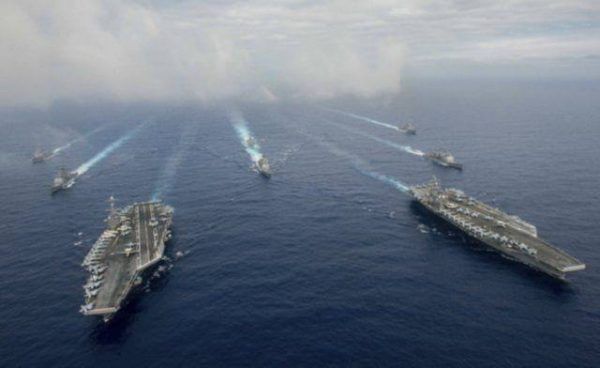We live in a busy world with a lot of information being thrown at you. Don’t feel overwhelmed. OpsLens will give you a weekly briefing on the major stories you need to know about and cut out all the extra information that isn’t important. Here’s your weekly briefing on what’s going on in national security and military news.
The Truth About the Number of Immigrant Recruits Getting Kicked out of the Army
A recent article by the Associated Press has reported that a growing number of foreign-born recruits who have joined the United States Army are being forced out of the military.
The article focuses on the MAVNI program, or the Military Accessions Vital to the National Interest, created during the George W. Bush administration. MAVNI allows legal, nonpermanent resident immigrants to join the military and get a fast track to citizenship.
While the MAVNI program has its flaws and many immigrant recruits are being shown the door due to a backlog of recruits waiting for security checks and background investigations, the Pentagon has stated that there is nothing unusual about the number of immigrants being kicked out.
While the number of immigrant recruits being kicked out appears to be rising, it has nothing to do with President Trump’s policy on immigration. MAVNI was stopped in 2017 and the Army has focused on performing better due diligence in investigating the backgrounds of recruits coming into the Army.
No Planned Troop Withdrawal from Europe
The Pentagon and White House are assessing the presence of U.S. troops in Germany, but a potential withdrawal will not be a talking point included in the NATO summit to be held next week. President Donald Trump has reportedly requested an analysis of the cost savings and impact a withdrawal of troops from Germany would have.
Germany is a major hub of U.S. military activity around the world and nearly 35,000 troops are stationed throughout the country. Rammstein Air Force Base plays a major role in air operations throughout Europe, while Landstuhl Regional Medical Center has been the primary medical evacuation point for wounded U.S. military personnel coming out of countries like Iraq and Afghanistan. It is often their first stop on their journey home.
Our presence in Europe is also heavily tied to protecting our NATO allies from Russian aggression, but President Trump has repeatedly criticized NATO for not shouldering their load financially or militarily. Poland recently requested a permanent U.S. military presence in their country, and offered to cover construction costs.
President Trump is scheduled to meet with Russian leader Vladimir Putin in the days after the NATO summit.

“Rammstein Air Base is a United States Air Force base in Rhineland-Palatinate, a state in south-western Germany. It serves as headquarters for the United States Air Forces in Europe – Air Forces Africa (USAFE-AFAFRICA) and is also a North Atlantic Treaty Organization installation.” (Credit: Facebook/I like Germany)
Poison Attack in the United Kingdom
A man and woman are critically ill in a British hospital after being exposed to a nerve agent. British police are on the hunt for a small vial feared to be contaminated with Novichok, an odorless liquid nerve agent that can kill a person within minutes.
Dawn Sturgess, 44, and Charlie Rowley, 45, remain in critical condition after falling ill within hours of each other on Saturday. British authorities believe they may have been exposed to the contaminated vial that was discarded after the March poison attack on ex-Russian spy Sergei Skripal and his daughter, Yulia. The British government has blamed the attack on Russia but the Kremlin has denied any involvement.
British Home Secretary Sajid Javid told Parliament on Thursday that it’s time for Russia to explain “exactly what has gone on.”
“It is completely unacceptable for our people to be either deliberate or accidental targets, or for our streets, our parks, our towns to be dumping grounds for poison,” Javid said.

July 5, 2018: Nerve agent used in Wiltshire poisoning was same type used in March attack, but cannot yet be attributed to same batch; if Russia was involved in latest poisoning, further action will be considered by the UK, says UK Home Secretary Sajid Javid. (Credit: Facebook/CGTN)
Iranian Harassment of American Warships has Stopped
Small Iranian gunboats constantly harassed United States Navy ships in the Persian Gulf in recent years but have completely stopped in 2018. During the Obama administration, these incidents were taking place around three times a month. These “unsafe interactions” happened 36 times in 2016 but that number dropped to 14 in 2017 and none have taken place so far this year.
The last unsafe interaction occurred nearly a year ago on Aug. 14, 2017, when an Iranian drone flew too close to an F/A-18 Hornet attempting to land aboard the aircraft carrier USS Nimitz, according to the Navy.
The Pentagon and Navy do not want to speculate on the reason behind the drop in number of incidents, but it is worth noting the timing of the change. President Donald Trump has changed U.S. policy toward Iran, including a withdrawal from the Iranian nuclear deal negotiated by the Obama administration.
Iran is now threatening to close the Strait of Hormuz if the United States reinstates oil sanctions. Nearly thirty percent of the world’s oil transits through the Strait of Hormuz and its closure would have a drastic impact on the region’s oil trade. It’s unclear if the suspension of harassment of American ships in the Persian Gulf by Iran would also be affected by this threat from Tehran.

March 2017: US Navy ships harassed by Iranian speed boats at Strait of Hormuz.(Credit: Facebook/Keith Trump)
Pompeo in North Korea
Secretary of State Mike Pompeo returned from his latest trip to North Korea on Saturday and is optimistic about “productive conversations” he had with top North Korean officials.
The North Koreans called the outcome of the discussion “worrisome” and added that its “willingness to denuclearize could falter.”
Pompeo, however, gave assurances Saturday that North Korea is still committed to dismantling their nuclear program.

(Credit: Facebook/Daily Callout)
“We talked about what the North Koreans are continuing to do and how it’s the case we can get our arms around achieving what Chairman Kim and President Trump both agreed to, which was the complete denuclearization of North Korea,” Pompeo said.
